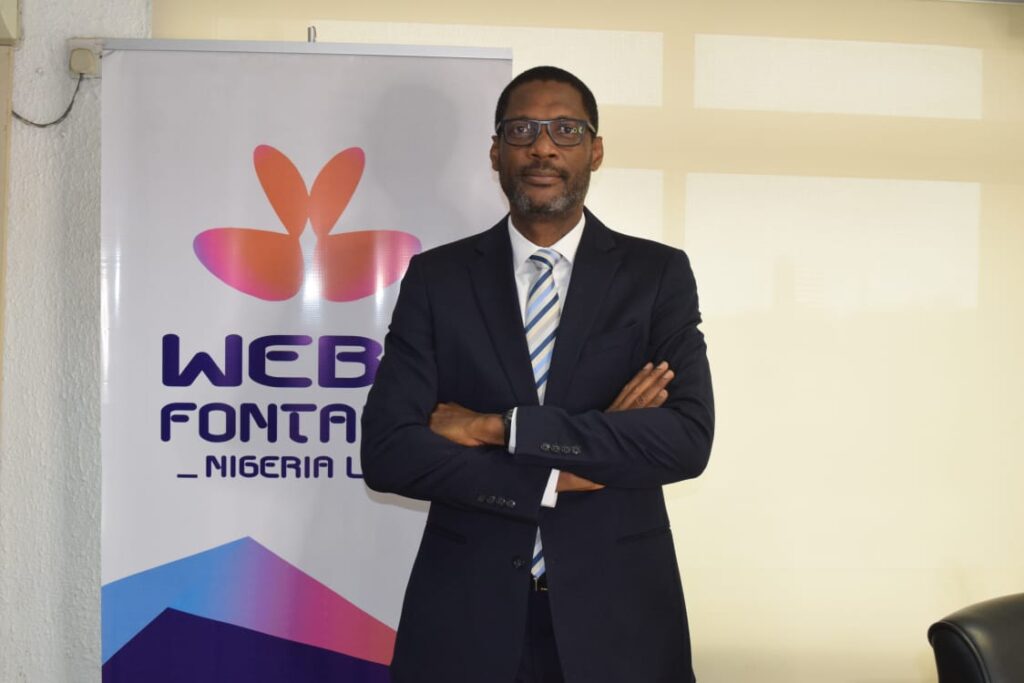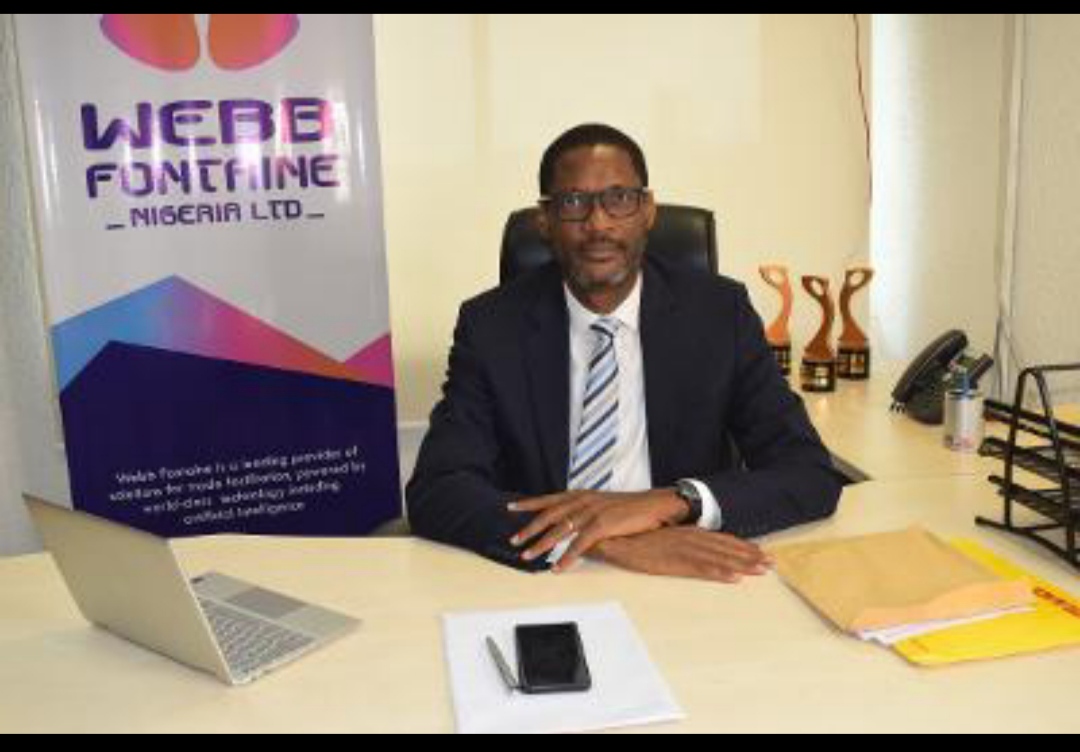Managing Director of Webb Fontaine in Nigeria, Ope Babalola, told reporters in Lagos over the weekend that his company is committed to supporting Nigerian economy through bespoke Information and Communication technology (ICT) solutions that is helping Nigeria Customs in revenue collection
According to him, despite the ongoing nationwide protests, Nigeria Customs Service (NSC) revenue is sustained unhindered through the company’s activities
The World Customs Organisation (WCO) recently appointed Webb Fontaine into its Private Sector Consultative Group (PSCG). What does this imply and how can countries like Nigeria benefit from this?
Webb Fontaine is grateful for the appointment given us by the WCO. It is indeed a recognition of the excellent work that the company is doing in 25 countries and counting. We have striven to give excellent service for years, and we aim to continue to do so.
The purpose and scope of the PSCG is to inform and advise the WCO Secretary General, the Policy Commission, and WCO Members on Customs and international trade matters from the perspective of the private sector. The PSCG complements the vital contributions made by private sector Observers to WCO Committee meetings. Appointments are made on merit, based on recommendations from WCO council members and regional vice-chairs.
We are proud of this membership and as a PSCG member, we are excited to be actively providing our valuable contributions to work of the group!
Sometime in May this year, you talked about Webb Fontaine procuring Starlink internet access to strengthen customs ICT for trade facilitation in Nigeria. Give us an update on this.
Webb Fontaine has been subject to the vagaries of our telecoms systems. As a result, some businesses people in Nigeria have decided to “go offline” and deploy Starlink, the internet provider owned by Elon Musk. We have pioneered this in a couple of sites and the initial signs are encouraging. We also understand that NCS is also testing independently in a couple of sites. We hope all this results in a better user experience for importers, agents and Customs officers. Our staff continues to monitor the situation.
In its recently released mid-year report, the NCS announced a collection of N2.7tr and surpassed it’s half year target by 8%. What role do you think ICT played in this and is WF in the picture of this achievement?
We know that this cannot be achieved without IT. Command after command is reporting record revenues.
And it’s not only that. The CGC today stated that despite the nationwide protests, Nigeria Customs will continue to provide services. Comptroller Olomu of Apapa reiterated the same for his command. This is because the Customs platform, NICIS II, is built as a paperless system and is fully automated. Our platforms in many other countries, using the same technology, operate as such. Because of that, it can withstand such disruptions. Agents, operators and declarants can all access the services online.
We have seen this in practice. During the covid lockdown, NCS was the only government agency that was actually generating revenue. In fact, that year was a huge increase in both revenues and number of declarations.
Nigeria has commenced test run export trade under the AfCFTA regime, how do you think WF geospatial and cargo tracking regime can help countries in trans-border transaction?
We’re very excited about this! I personally believe that the future is Africa. Intra-African trade is less than 20% of total trade conducted by African countries. This will encourage us to trade more internally.
Our company is are way ahead of the existing deployments in the maritime and trade industries in Nigeria and many countries on the continent and we’re eager for an opportunity to showcase these to help Nigeria be a leader in the AfCFTA.
We already provide solutions in 12 African countries, and are prepared to do even more than that. Incidentally, both Republic of Benin and Niger use Webb Fontaine technology. This goes beyond geospatial and cargo tracking. We also have technology that can create and transmit data between countries in the continent, while providing statistics for governments to use for decision making and monitoring. Our existing and already deployed solutions can verify the integrity of origin for the purpose of protecting the tenets of the AfCFTA.

Your company has a robust and productive system in many other countries including neighbouring Benin Republic, leading to port efficiency, maximum revenue collection and other artificial intelligence related merits for trade. Why have you not replicated same in Nigeria?
We have deployed many improvements to Customs operations in Nigeria. You only have to talk to people who have been in the system for a few years. They can tell you the difference between what was and what presently exists. And we continue to make improvements as technologies change and improve, and as the nation’s needs evolve.
I also need to express my gratitude to the ICT officers and the CG for the cooperation they have shown and given us. I wish I could name names but I don’t believe I can. They are really excellent men and women of integrity.
It is important to note though, that our contract renewals for several years have taken a very tortuous path. Payments also tend to remain outstanding for years. It becomes difficult therefore to continue reinvesting as we need to and wish to. Nevertheless, we continue to provide our best services despite the constraints. NCS’s revenue profile for this year will testify to that.
We recognize the challenges the Federal Government is facing in boosting the economy and we are always committed to supporting government. If we don’t play our part, it will have an adverse effect on the economy, and that is not our wish to play after so many years of fruitful and successful partnership.
Earlier this year, President Tinubu launched the National Single Window Initiative to Enhance Revenue Generation and Streamline Import/Export Trade Process for Ease of Business. What impact do you think this will have on our economy?
This is a really commendable and worthy initiative that President Tinubu has launched. I will speak specifically to the Trade environment, because my understanding is that this Single Window scheme goes beyond that.
A Single Window for Trade allows all actors and participants involved in Trade to come to a central place to access information, and to engage in the processes required with CBN, Revenue Authority, SON, NAFDAC, Customs, NDLEA, and all other relevant agencies. We already have a lot of this but this initiative will enhance it further and make the trade flow much smoother, faster and hopefully less expensive for importers, manufacturers and by extension, the general public.
Give us an insight into the difference(s) between single window and port community system?
It’s actually not complicated. Single Window is the entry point. Under it, you will find the links to the portals for the associated agencies such as Customs, Ports, Aviation etc. Each of these will run their own internal systems but there will be common information that can be shared. Instead of duplicating information and data or going from agency to agency, common data can be shared and accessed.
Also, processes involving input from two or more agencies can benefit from a common platform where data flows from one actor to another following a clear, predictable path.
For example, both Customs and Ports use same shipping data. The information is the same. Why can’t it be input once, stored and shared on the Single Window platform, for use by all interested parties that qualify for access? That is so much easier and more secure eliminating the errors and the waste of time introduced by the repeated capture of the same data by users.
So, the Single Window is the platform where eligible users have access to the common data required. It is the platform to produce or consume data according to preprogramed workflows.
Can Port Community System run under Single Window without any hitch or operational overlap?
Of course it can. SW is simply an entry point. Once in, the participants can engage the agencies in the Single Window. It’s like going into a shopping mall. There are several stores that sell different things or provide various services from ice-cream to opticians. Just get to the mall and find the store you need. The two are not rivals – they are symbiotic!
Moreover, other agencies that are part of the Single Window can benefit from the high quality of data produced by the Port Community System platform.

Tell us about how your operations in Nigeria have impacted the economy and other areas.
We are very proud of our record in Nigeria, and the impact we’ve made since 2006. Along with the management of Nigeria Customs Service, we have helped to take Customs operations from manual to fully computerized and paperless operations.
Between 2017 to 2023, Customs revenue generation has increased from N1.028 trillion to N3.192 trillion You can see the growth and contribution to the economy. Every day you read about Customs commands generating record revenues, that’s evidence of our contribution, since it is still our technology in use. Under normal circumstances we should expect to see nothing less than N4.5 trillion in revenues this year.
Economically, where do you think Nigeria will be in the next five years if the NSW takes off with efficient implementation?
While the NSW is not the solution to all our problems, it can certainly make Business to Government interactions much easier to navigate. And easier navigation makes life easier for people.
What it will do if properly implemented is that is should speed up the customs process, decongest our ports, reduce the cost of goods in the markets by reducing the cost of importation, and reduce corruption by removing a lot of human intervention. This is the classic definition of Ease of Doing Business.
It will also increase Nigeria’s attractiveness to new, major, investors by showing the country’s government commitment to utilize state of the art technology to improve the business climate.
Tell us about some of the countries WF operate and how they have benefitted from your work?
WF operates in 25countries worldwide. We provide a wide range of services, and different combinations or aspects of those services in each location, depending on what we’re contracted to do. In the countries of Benin Republic and Cote d’Ivoire, we are the Customs and ports operators, and we can see how well those countries are doing. We are also in Guinea, DR Congo to the North, Kenya and Ethiopia to the East and Libya to the north, just to give a few examples. Outside of Africa, we operate in Ajman, Bahrain, Nepal and Panama among others. We are a truly global brand.
Our Research and Development Centres are the largest in the industry, and are in several locations in Armenia, Philippines, Switzerland.
Our work speaks for itself. In many of those countries, we have introduced innovations that have led to improved trade processes and sector developments. At times, one sector even recommends us to another.
Is there a place for knowledge transfer and career progression for Nigerians working with Webb Fontaine?
95% of our staff in Nigeria are Nigerians, including myself of course and some of my management team. Although we are a global operation, locally we are very Nigerian and proud to be so. In addition, where there are global opportunities, our Nigerian staff are welcome to apply. We are one big family.













